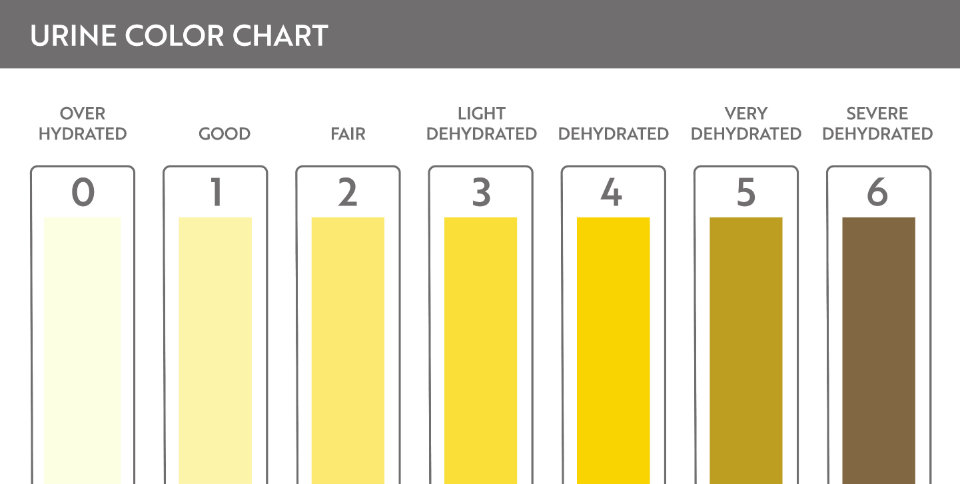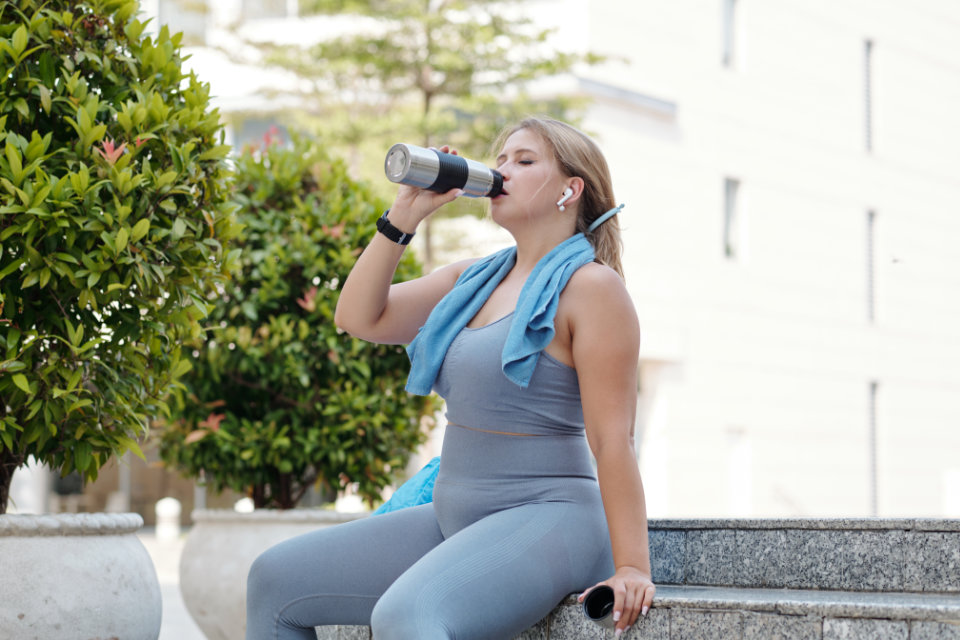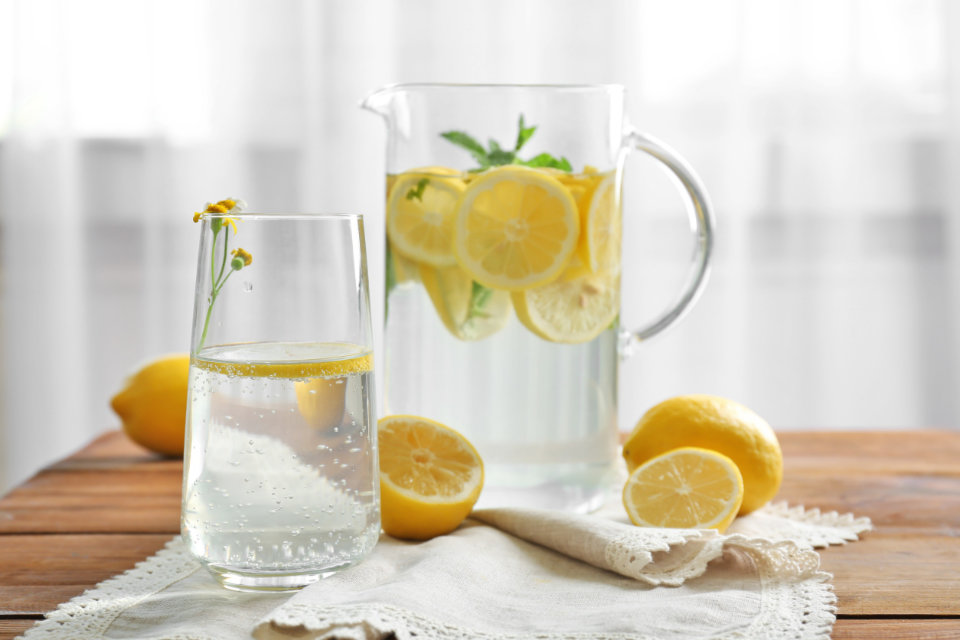How much you need to drink is dependable on how active you are, the weather and your physiology. Generally, the human body needs at least eight glasses of water per day according to the National Academies of Sciences, Engineering, and Medicine, but most people only drink half that amount.
To stay hydrated, aim for 8 x 8-ounce (240ml) glasses of water every day.
Why You Should Be Drinking 8 Glasses Of Water Every Day?
Water also known as its scientific name dihydrogen monoxide or hydrogen dioxide is calorie-free. There are numerous health benefits from drinking at least 8 glasses of water every day.
If you’re not drinking enough water, you might notice some symptoms such as headaches, fatigue, dry skin, constipation, and muscle cramps. These are signs that your body isn’t getting enough fluids.
There is no fixed amount of water that needs to be consumed each day, but there is general agreement on a recommended healthy fluid intake as:
- Men: approximately 3.7 liters or 125 oz
- Women: approx. 2.7 liters or 91 oz
About 15.5 cups for men and 11 cups for women. However, about 80% of this is said to come from beverages, including water, and the remainder from food.
Benefits of Drinking Enough Water
Drinking enough water each day is essential for good health. It helps keep your skin looking young and healthy, your hair shiny and strong, and your muscles toned. It also helps regulate your blood pressure, heart rate, digestion, and metabolism.
- Drinking water helps maintain blood pressure, transport nutrients, maintains fluid balance, aids digestion, protect cells against damage and plays a role in many bodily functions.
- The human body contains about 60% water. Drinking enough water helps keep your body hydrated, which is essential for maintaining normal function.
- The human body needs at least 2 litres of fluid per day. This includes both drinking and sweating.
- Drinking enough water will help prevent constipation, indigestion, headaches, and fatigue.
- Water is essential for digestion and absorption of nutrients. It also helps flush out toxins and waste products from your system.
- Dehydration can affect the structure and function of the brain. It is also involved in the production of hormones and neurotransmitters. Prolonged dehydration can cause problems with thinking and reasoning.
- Some scientists have suggested that drinking more water may improve performance during strenuous exercise. One study found that dehydration can affect performance for activities longer than 30 minutes.
- Drinking water instead of sweetened juices and sodas can also help with weight loss. Drinking water before meals can help prevent overeating by inducing a feeling of fullness.
How Much Water Should I Drink According To Weight?
In general, you can use this simple calculation to calculate how much water you should drink each day.
Water you drink per day (liters) = your body weight (kg) multiplied by 0.033.
For example, if you weigh 60 kg, you should drink about 1.98 liters of water every day. Remember to adjust according to your activity level.
How Do I Know If I Am Drinking Enough Water?
To tell if a person is dehydrated, they usually become thirsty, their urine becomes darker in color, and they lose more than 1% of their body weight in a short period of time, such as an hour or a day. Use the hydration test to find out if you are drinking enough water.
3 Steps – Hydration Test:
- Step 1: Assess the color of your urine using a standardised urine color chart.
If your score is 4 or higher, you are probably dehydrated. However if you’ve been drinking too little fluid each day for a long period of time, dark urine may be the only sign you’re dehydrated. - Step 2: Check your weight
After going to the toilet for the first time, weigh yourself. If you lose more than 1% of your body weight compared to yesterday morning, you may be dehydrated. - Step Three: Check your thirst level
Do you wake up feeling thirsty? Research shows that the combination of thirst and weight loss is a strong indicator of dehydration.

However you might need more water if you:
- Live in hot, humid, or dry areas or in the mountains or at a high altitude
- Drink a lot of caffeinated beverages, such as coffee or your diet is high in salty, spicy, or sugary foods
- Spend more time outdoors in the sun or hot temperatures
- Exercise or perform any intense activity
- Have an infection or a fever, vomiting or diarrhea
- Are on medications like diuretics which make you lose water
- Are pregnant or breastfeeding
How Much Water Should I Drink If I’m Exercising?
Drinking Water Before Work Out
It is important to drink water before running or starting any exercise. Drink 17 to 20 ounces (500 to 600 ml) of water 2 to 3 hours before starting exercise and 8 ounces (235 ml) of water during your warm-up.
Drinking Water During Work Out
Hydration is paramount during exercise. You lose water and electrolytes through sweat even though you don’t see it sometimes when you are doing less intense workout such as jogging or walking, so you should re-hydrate during exercise.
Drink 7 to 10 ounces (200 to 300 ml) of fluid every 10 to 20 minutes during exercise.
Don’t forget to carry a water bottle with you while exercising. This allows you to take a quick and easy sip of water during your workout. Wearing a high quality quick dry running t-shirt or running singlet can help to disperse your body heat and sweat more efficiently, reducing your rate of dehydration.
Drinking Water After Work Out
You should also stay hydrated after your workout. This is when your body can absorb fluids most efficiently. Drink 8 ounces (235 ml) of water within 30 minutes of your workout.
For runners and athletes, drink 16 to 24 ounces (470 to 710 ml) of fluid for every 450g of body weight you lose after exercising.

How Much Water is Too Much?
Drinking too much water than your kidneys can eliminate can lead to hyponatremia. Hyponatremia occurs when sodium levels in the blood are abnormally low.
The kidneys can only eliminate 27 to 34 (0.8 to 1 litres) ounces of water per hour, or a total of 676 to 947 ounces (20 to 28 litres) per day. Drinking anything more than that could put you in the danger zone, though it’s rare to die from drinking too much water.
Avoid over drinking of water if you have certain medical conditions or are taking medications that cause water retention, such as opioids, antidepressants, or other medications.
Drink enough water to keep your urine light yellow without much smell, but not so much that it’s always clear or keeps you in the bathroom all day.
Meanwhile, it’s common that exercise and hot weather can cause people to drink too much water, especially in soldiers and marathon runners. Consider hydrating with an sports drink that contains sodium.
What Happens If I Drink Too Much Water?
Drinking too much water can lead to water intoxication also known as hyperhydration, water toxemia or water poisoning.
There’s no hard and fast rule on how much water can kill you, but doctors don’t recommend drinking more than a litre (L) or so per hour over several hours.
The amount of water elderly and children can safely drink per hour might be a bit lower due to less efficient kidneys. Water intoxication occurs more quickly in children and the elderly.
You may developed signs of water poisoning after you drink more than 3 to 4 litres of water within a few hours such as:
- headache
- nausea or vomiting
- dizziness and fatigue
- cramps, spasms, or muscle weakness
What is The Proper Way to Drink Water?
Here are some tips on how to drink your water:
- Always choose to drink warm water
- Sit down and drink water
- Drink slowly
- Drink water even if you are not thirsty
- Start the day with a glass of water
- Avoid drinking water while eating
When Should I Drink Water Throughout The Day?
Do you know when is the best time of day to drink water? We have some tips for you:
- When You Wake Up
After waking up, drink a glass or two of water to activate your internal organs. Water helps flushes out the stomach and remove toxins.
- Before and After Meals
Drink a glass of water 30 minutes before meals to aid digestion. Remember not to drink it too early, before or after meals, as the water will dilute the digestive juices. Drink water an hour after meals to allow the body to absorb nutrients.
- Before, During and After Workout
Stay hydrated before, during, and after exercising.
- Before Showering
Drinking a glass of water before taking a bath can lower blood pressure.
- Before Going to Bed
Drink a glass of water an hour before bed to replenish any fluid loss that may occur during the night.
| 7 a.m. – After wake up | 1st Glass |
| 9 a.m. – After breakfast | 2nd Glass |
| 11:30 a.m. – Before Lunch | 3rd Glass |
| 13:30 p.m. – After Lunch | 4th Glass |
| 15:00 p.m. – Tea Break | 5th Glass |
| 17:00 p.m. – Before dinner | 6th Glass |
| 20:00 p.m. – After dinner and before shower | 7th Glass |
| 22:00 p.m. – Before bed | 8th Glass |
Can You Replace Water with Other Fluids?
Yes. You don’t have to rely on water alone for your hydration needs. What you eat also provides a large portion. For example, many fruits and vegetables, such as watermelon and spinach, are almost 100 percent water.
In addition, beverages such as milk, juices, and herbal teas are mainly composed of water. Even caffeinated beverages—like coffee and soda—can increase your daily water intake. But avoid sugary drinks. Regular sodas, energy drinks, sports drinks, and other sweetened beverages are often high in added sugar and can provide more calories than needed.
You can also choose how you drink your water. For example, sparkling mineral water, or if you like added vitamins and electrolytes in your water, you can try different types of fortified water.
If you don’t like the smell of your tap water or just want to be extra careful, you can purify your tap water at home with a water filter.
How About Drinking Lemon Water?
Drinking lemon water has several benefits. So if you want to make your water more refreshing, you can add lemon to your water to have an extra vitamin C and antioxidants to your diet. Squeeze half a lemon into 8 ounces of warm or cold water.

Photo Credit: 123RF
Benefits of drinking lemon water include:
- Drinking lemon water before meals can help promote and improve digestion.
- The citric acid in lemons helps prevent kidney stones.
- Lemon water is an easy alternative to sugary drinks.
- Drinking lemon water can help increase your water intake, which is often recommended as a weight loss strategy.
- Citrus fruits like lemons contain vitamin C, a major antioxidant that protects cells from harmful free radicals.
More Answers About How Much Water to Drink
How much water should I drink?
The amount of water that someone should drink varies greatly from person to person based on many factors. But health experts found that adequate daily fluid intake is about 15.5 cups (3.7 liters) of fluid per day for men. Women get about 11.5 cups (2.7 liters) of fluid per day.
What are the benefits of drinking water?
Drinking enough water every day is important for your health. Drinking water can prevent dehydration, a condition that can lead to clouded thinking, mood swings, overheating, constipation and kidney stones.
Should you drink more water if you exercise a lot?
Yes, when you’re physically active, make hydration a priority. Staying hydrated helps maintain focus and performance, increases endurance, and prevents excessive increases in heart rate and body temperature.
What happens if you don't drink enough water while exercising?
If you don’t drink enough water, you can become dehydrated. Dehydration can lead to decreased performance and affect your health.
How many minutes should I wait to drink water after workout?
Within 30 minutes of completing the workout routine, drink another 8 ounces and continue to gulp down 16 to 24 ounces for each pound you lost during the workout to regain the water you sweated out.





